North Andover (978) 686-7623
Tewksbury (978) 640-1010
Blog
October 2018
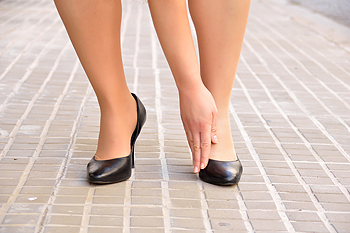 There are many women who enjoy wearing high heels despite knowing foot pain may develop from wearing these specific type of shoes. Research has shown that when the heel is high, the arch in the foot may become inflamed and this may typically cause pain and discomfort. If high heels are worn on a frequent basis, the toes may undergo stress, and this may possibly cause corns and calluses to develop. The likelihood of incurring a fall may increase as a result of the line of gravity being altered by the height of the heel. There are several ways to enjoy wearing high heels while keeping your feet as comfortable as possible. These may include slipping off your shoes at an appropriate time and performing gentle stretching exercises, including pointing, flexing and rolling your ankles. Additionally, circulation in the feet may be increased by wiggling the toes. Your feet may benefit by wearing shoes that are more comfortable the following day, which may allow the foot muscles to rest. Please speak to a podiatrist if you would like additional information concerning the dangers of wearing high heels.
There are many women who enjoy wearing high heels despite knowing foot pain may develop from wearing these specific type of shoes. Research has shown that when the heel is high, the arch in the foot may become inflamed and this may typically cause pain and discomfort. If high heels are worn on a frequent basis, the toes may undergo stress, and this may possibly cause corns and calluses to develop. The likelihood of incurring a fall may increase as a result of the line of gravity being altered by the height of the heel. There are several ways to enjoy wearing high heels while keeping your feet as comfortable as possible. These may include slipping off your shoes at an appropriate time and performing gentle stretching exercises, including pointing, flexing and rolling your ankles. Additionally, circulation in the feet may be increased by wiggling the toes. Your feet may benefit by wearing shoes that are more comfortable the following day, which may allow the foot muscles to rest. Please speak to a podiatrist if you would like additional information concerning the dangers of wearing high heels.
High heels have a history of causing foot and ankle problems. If you have any concerns about your feet or ankles, contact one of our podiatrists from Foot Health Center of Merrimack Valley. Our doctors can provide the care you need to keep you pain-free and on your feet.
Effects of High Heels on the Feet
High heels are popular shoes among women because of their many styles and societal appeal. Despite this, high heels can still cause many health problems if worn too frequently.
Which Parts of My Body Will Be Affected by High Heels?
- Ankle Joints
- Achilles Tendon – May shorten and stiffen with prolonged wear
- Balls of the Feet
- Knees – Heels cause the knees to bend constantly, creating stress on them
- Back – They decrease the spine’s ability to absorb shock, which may lead to back pain. The vertebrae of the lower back may compress.
What Kinds of Foot Problems Can Develop from Wearing High Heels?
- Corns
- Calluses
- Hammertoe
- Bunions
- Morton’s Neuroma
- Plantar Fasciitis
How Can I Still Wear High Heels and Maintain Foot Health?
If you want to wear high heeled shoes, make sure that you are not wearing them every day, as this will help prevent long term physical problems. Try wearing thicker heels as opposed to stilettos to distribute weight more evenly across the feet. Always make sure you are wearing the proper shoes for the right occasion, such as sneakers for exercising. If you walk to work, try carrying your heels with you and changing into them once you arrive at work. Adding inserts to your heels can help cushion your feet and absorb shock. Full foot inserts or metatarsal pads are available.
If you have any questions please feel free to contact one of our offices located in North Andover, and Tewksbury, MA . We offer the newest diagnostic and treatment technologies for all your foot and ankle needs.
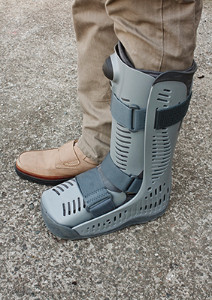 Research has shown the ankle is comprised of three bones that interlock together. If an injury is endured that fractures one or more of these bones, it is often referred to as a broken ankle. There are several ligaments and tendons that are attached to these specific bones and may become displaced if the ankle becomes fractured. This typically may occur if a fall has happened and the ankle twists unnaturally. The noticeable symptoms may often include severe pain in and around the affected ankle, unsightly bruising, or difficulty in moving the toes. There are several ways to treat this condition, including wearing a protective boot, taping or wrapping the ankle, which may provide additional support, or possible surgery, which is often determined by the severity of the fracture. If you have broken your ankle, it’s advised to speak with a podiatrist as quickly as possible so the correct choice of treatment can begin.
Research has shown the ankle is comprised of three bones that interlock together. If an injury is endured that fractures one or more of these bones, it is often referred to as a broken ankle. There are several ligaments and tendons that are attached to these specific bones and may become displaced if the ankle becomes fractured. This typically may occur if a fall has happened and the ankle twists unnaturally. The noticeable symptoms may often include severe pain in and around the affected ankle, unsightly bruising, or difficulty in moving the toes. There are several ways to treat this condition, including wearing a protective boot, taping or wrapping the ankle, which may provide additional support, or possible surgery, which is often determined by the severity of the fracture. If you have broken your ankle, it’s advised to speak with a podiatrist as quickly as possible so the correct choice of treatment can begin.
Broken ankles need immediate treatment. If you are seeking treatment, contact one of our podiatrists from Foot Health Center of Merrimack Valley. Our doctors can provide the care you need to keep you pain-free and on your feet.
Broken Ankles
A broken ankle is experienced when a person fractures their tibia or fibula in the lower leg and ankle area. Both of these bones are attached at the bottom of the leg and combine to form what we know to be our ankle.
When a physician is referring to a break of the ankle, he or she is usually referring to a break in the area where the tibia and fibula are joined to create our ankle joint. Ankles are more prone to fractures because the ankle is an area that suffers a lot of pressure and stress. There are some obvious signs when a person experiences a fractured ankle, and the following symptoms may be present.
Symptoms of a Fractured Ankle
- Excessive pain when the area is touched or when any pressure is placed on the ankle
- Swelling around the area
- Bruising of the area
- Area appears to be deformed
If you suspect an ankle fracture, it is recommended to seek treatment as soon as possible. The sooner you have your podiatrist diagnose the fracture, the quicker you’ll be on the way towards recovery.
If you have any questions, please feel free to contact one of our offices located in North Andover, and Tewksbury, MA . We offer the newest diagnostic and treatment technologies for all your foot care needs.
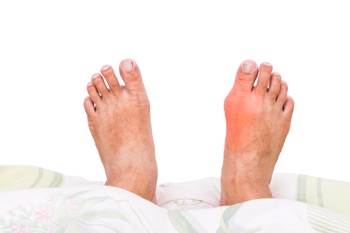 An excess of uric acid levels in the blood may lead to a painful condition known as gout. When the body has difficulty in processing this buildup, crystals will typically form in the joint of the big toe. It is often considered to be a form of arthritis, and may cause considerable pain and discomfort. This ailment may develop as a result of ingesting foods that are rich in purines, which may often include red wine, seafood or chocolate. Research has shown there may be several predispositions for gout to occur. People who have high blood pressure or who have abnormal kidney functions may be at a greater risk to develop this ailment. Patients who are afflicted with gout are aware of the intense pain, swelling and redness that accompanies this predicament. If you have developed gout it's suggested to consult with a podiatrist who can provide valuable information about the treatment of this debilitating condition.
An excess of uric acid levels in the blood may lead to a painful condition known as gout. When the body has difficulty in processing this buildup, crystals will typically form in the joint of the big toe. It is often considered to be a form of arthritis, and may cause considerable pain and discomfort. This ailment may develop as a result of ingesting foods that are rich in purines, which may often include red wine, seafood or chocolate. Research has shown there may be several predispositions for gout to occur. People who have high blood pressure or who have abnormal kidney functions may be at a greater risk to develop this ailment. Patients who are afflicted with gout are aware of the intense pain, swelling and redness that accompanies this predicament. If you have developed gout it's suggested to consult with a podiatrist who can provide valuable information about the treatment of this debilitating condition.
Gout is a foot condition that requires certain treatment and care. If you are seeking treatment, contact one of our podiatrists from Foot Health Center of Merrimack Valley. Our doctors will treat your foot and ankle needs.
What Is Gout?
Gout is a type of arthritis caused by a buildup of uric acid in the bloodstream. It often develops in the foot, especially the big toe area, although it can manifest in other parts of the body as well. Gout can make walking and standing very painful and is especially common in diabetics and the obese.
People typically get gout because of a poor diet. Genetic predisposition is also a factor. The children of parents who have had gout frequently have a chance of developing it themselves.
Gout can easily be identified by redness and inflammation of the big toe and the surrounding areas of the foot. Other symptoms include extreme fatigue, joint pain, and running high fevers. Sometimes corticosteroid drugs can be prescribed to treat gout, but the best way to combat this disease is to get more exercise and eat a better diet.
If you have any questions please feel free to contact one of our offices located in North Andover, and Tewksbury, MA . We offer the newest diagnostic and treatment technologies for all your foot and ankle needs.
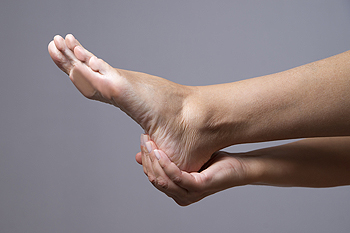 The majority of warts can be unsightly and painful, and a plantar wart is no exception. This type of wart develops on the heel of the foot and will grow inward as a result of the pressure the feet endures on a daily basis. It is known to be caused by the human papillomavirus, which is also referred to as HPV, and may be more prevalent in children and people who have compromised immune systems. This contagious virus can be transmitted by direct contact with a person who may carry the germ or from an object that may have been contaminated. Some of the symptoms that might be associated with plantar warts may include a small area that may be rough in texture on the heel of the foot. Additionally, there may be tiny black dots in the center of the wart, and you may experience pain while walking or standing. If you are afflicted with plantar warts, it’s suggested to speak with a podiatrist who can offer correct treatment options that may include removal of the wart.
The majority of warts can be unsightly and painful, and a plantar wart is no exception. This type of wart develops on the heel of the foot and will grow inward as a result of the pressure the feet endures on a daily basis. It is known to be caused by the human papillomavirus, which is also referred to as HPV, and may be more prevalent in children and people who have compromised immune systems. This contagious virus can be transmitted by direct contact with a person who may carry the germ or from an object that may have been contaminated. Some of the symptoms that might be associated with plantar warts may include a small area that may be rough in texture on the heel of the foot. Additionally, there may be tiny black dots in the center of the wart, and you may experience pain while walking or standing. If you are afflicted with plantar warts, it’s suggested to speak with a podiatrist who can offer correct treatment options that may include removal of the wart.
Plantar warts can be very uncomfortable. If you need your feet checked, contact one of our podiatrists from Foot Health Center of Merrimack Valley. Our doctors will assist you with all of your foot and ankle needs.
About Plantar Warts
Plantar warts are the result of HPV, or human papillomavirus, getting into open wounds on the feet. They are mostly found on the heels or balls of the feet.
While plantar warts are generally harmless, those experiencing excessive pain or those suffering from diabetes or a compromised immune system require immediate medical care. Plantar warts are easily diagnosed, usually through scraping off a bit of rough skin or by getting a biopsy.
Symptoms
- Lesions on the bottom of your feet, usually rough and grainy
- Hard or thick callused spots
- Wart seeds, which are small clotted blood vessels that look like little black spots
- Pain, discomfort, or tenderness of your feet when walking or standing
Treatment
- Freezing
- Electric tool removal
- Laser Treatment
- Topical Creams (prescription only)
- Over-the-counter medications
To help prevent developing plantar warts, avoid walking barefoot over abrasive surfaces that can cause cuts or wounds for HPV to get into. Avoiding direct contact with other warts, as well as not picking or rubbing existing warts, can help prevent the further spread of plantar warts. However, if you think you have developed plantar warts, speak to your podiatrist. He or she can diagnose the warts on your feet and recommend the appropriate treatment options.
If you have any questions please feel free to contact one of our offices located in North Andover, and Tewksbury, MA . We offer the newest diagnostic and treatment technologies for all your foot and ankle needs.
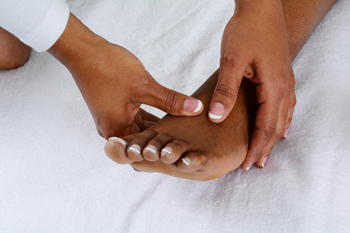 Research has shown that if the feet are enduring structural problems, it may lead to improper foot function, which may affect the body. Some of these misalignments of the feet may include low arches, feet that have a tendency to roll inward, also referred to as overpronation, or supinated feet, which is the term for feet that roll outward. If these conditions are present, some of the symptoms that may be experienced may include ankle pain, discomfort in or around the arch of the foot, and pain involving the Achilles tendon. If you are experiencing ailments that may include shin splints, heel pain or uneasiness during walking or running, it is suggested to consult with a podiatrist so a proper analysis can be performed. Additionally, a discussion about correct treatment options may be advised. This may include performing exercises, which may strengthen weak muscles and wearing orthotics that are specifically fitted to your foot.
Research has shown that if the feet are enduring structural problems, it may lead to improper foot function, which may affect the body. Some of these misalignments of the feet may include low arches, feet that have a tendency to roll inward, also referred to as overpronation, or supinated feet, which is the term for feet that roll outward. If these conditions are present, some of the symptoms that may be experienced may include ankle pain, discomfort in or around the arch of the foot, and pain involving the Achilles tendon. If you are experiencing ailments that may include shin splints, heel pain or uneasiness during walking or running, it is suggested to consult with a podiatrist so a proper analysis can be performed. Additionally, a discussion about correct treatment options may be advised. This may include performing exercises, which may strengthen weak muscles and wearing orthotics that are specifically fitted to your foot.
If you have any concerns about your feet, contact one of our podiatrists from Foot Health Center of Merrimack Valley. Our doctors can provide the care you need to keep you pain-free and on your feet.
Biomechanics in Podiatry
Podiatric biomechanics is a particular sector of specialty podiatry with licensed practitioners who are trained to diagnose and treat conditions affecting the foot, ankle and lower leg. Biomechanics deals with the forces that act against the body, causing an interference with the biological structures. It focuses on the movement of the ankle, the foot and the forces that interact with them.
A History of Biomechanics
- Biomechanics dates back to the BC era in Egypt where evidence of professional foot care has been recorded.
- In 1974, biomechanics gained a higher profile from the studies of Merton Root, who claimed that by changing or controlling the forces between the ankle and the foot, corrections or conditions could be implemented to gain strength and coordination in the area.
Modern technological improvements are based on past theories and therapeutic processes that provide a better understanding of podiatric concepts for biomechanics. Computers can provide accurate information about the forces and patterns of the feet and lower legs.
Understanding biomechanics of the feet can help improve and eliminate pain, stopping further stress to the foot.
If you have any questions please feel free to contact one of our offices located in North Andover, and Tewksbury, MA . We offer the newest diagnostic and treatment technologies for all your foot and ankle needs.
Blog Archives
- 2024
- 2023
- 2022
- 2021
- 2020
- 2019
- 2018









